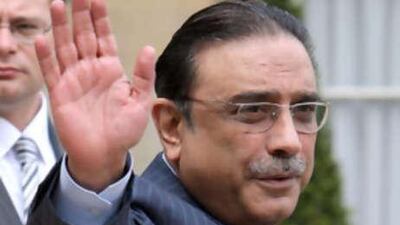Devastating floods at home and a bitter row over terrorism abroad were not enough to stop Asif Ali Zardari, the president of Pakistan, from embarking on a week-long European tour last night.
Opposition politicians called on Mr Zardari to at least cancel the UK leg of his tour after British Prime Minister David Cameron accused Pakistan last week of exporting terrorism. Mr Zardari, however, remains committed to fulfilling his original itinerary with visits to France and Britain. Meanwhile, the death toll from monsoon floods in northwest Pakistan has reached at least 1,100 with more than a million people affected and forecasters predicting more rain.
The president was able to put such concerns behind him, at least temporarily, when he arrived in Paris last night for a visit most likely to be dominated by trade. Pakistan is keen to get greater access for its goods in the European Union and Mr Zardari is expected to forcefully press his case today in talks with President Nicolas Sarkozy. For his part, Mr Sarkozy will raise in his own concerns over the security situation in Pakistan, especially along the Afghan border.
The stickier part of Mr Zardari's trip will begin on Tuesday evening when he arrives in the UK. Last Friday, intelligence officials in Islamabad cancelled their own trip to Britain in protest at Mr Cameron's remarks. They had planned to discuss greater security cooperation with their counterparts in London. Mr Zardari did not make the decision to call off the visit. The chiefs of Pakistan's Inter Services Intelligence (ISI) agency called it off.
The ISI and military leaders have not only been outraged by Mr Cameron's comments, but also by the fact he made them in India. Mr Cameron said in Bangalore on Wednesday: "We should be very, very clear with Pakistan that we want to see a strong, stable and democratic Pakistan. "We cannot tolerate in any sense the idea that this country is allowed to look both ways and is able, in any way, to promote the export of terror, whether to India or whether to Afghanistan or anywhere else in the world."
Although Mr Cameron's office insisted that he was talking about Pakistan as a country, not the government, it did not help that his comments came days after WikiLeaks revealed secret US documents, some of which accused the ISI of secretly helping the Afghan insurgency. Prime Minister Yusuf Gilani reprimanded Mr Cameron, saying that he should make any comments on security through diplomatic channels. In a speech in the Punjab on Saturday, he told his UK counterpart that he should also have condemned "human rights abuses" in Indian-controlled Kashmir.
However, Qamar Zaman Kaira, Pakistan's information minister, says that despite the "outrage" over Mr Cameron's remarks, relations between the two countries remain strong. Mr Kaira believes that any confusion over Pakistan's commitment to tackling terrorism will be cleared up when Mr Zardari travels to Chequers, the UK prime minister's country residence, for talks with Mr Cameron on Friday. "We will put the record straight and we believe after that the co-operation will keep on going," he said, adding that Mr Cameron's statement was "a misperception" and that Mr Zardari would "explain the facts" to the prime minister.
Mr Kaira added: "If the prime minister of the UK has said something that is contrary to the facts on the ground, it doesn't mean that we should boycott each other. "The president of Pakistan will explain and have a dialogue and good discussion and he will explain the facts to the new government over here. We hope that the new management - the new leadership - over here, when they get the exact picture, will agree with us."
However, British concerns over Pakistan's "export of terror" are real enough. Security chiefs estimated that three-quarters of all terrorist plots in the UK have their roots in, or are linked to, Pakistan. Sir Hilary Synott, former British high commissioner to Pakistan, told the BBC that the fact Mr Cameron made his comments in India only added insult to injury as far as the Pakistanis were concerned.
But he pointed out that both India and Britain had suffered at the hands of terrorists with links to such groups as Lashka-e-Toiba and the Hakani network. "It's quite clear Pakistan hasn't been controlling these groups sufficiently, so there comes a time - and it's for a politician to judge this time - when these matters have to be said more strongly." But Gen Hamid Gul, former head of the ISI, described Mr Cameron's comments as a "huge mistake" that had upset the entire Pakistani nation. "The UK had always maintained a very delicate balance between India and Pakistan and this has been rather rudely broken," he said.
@Email:dsapstead@thenational.ae
